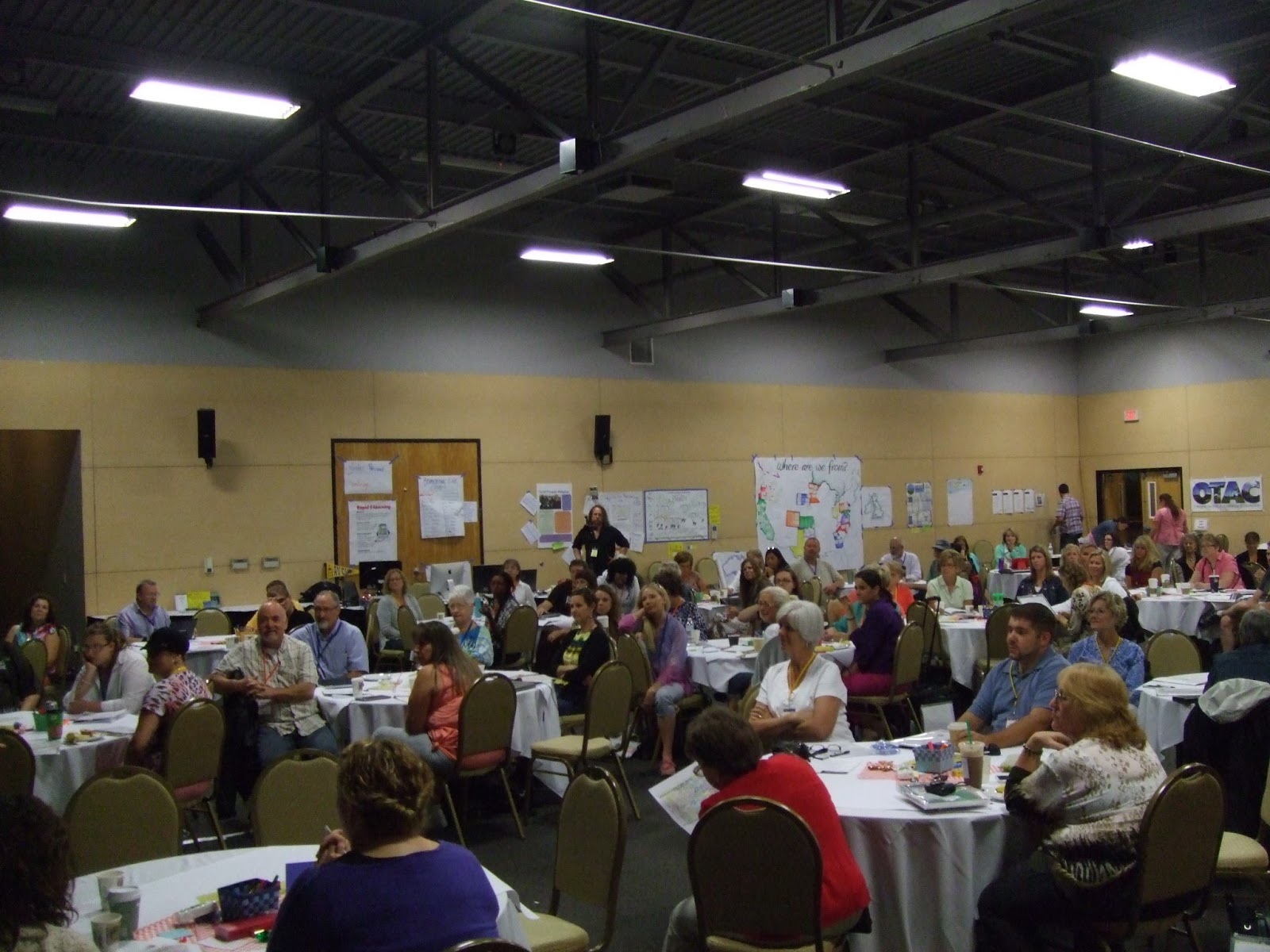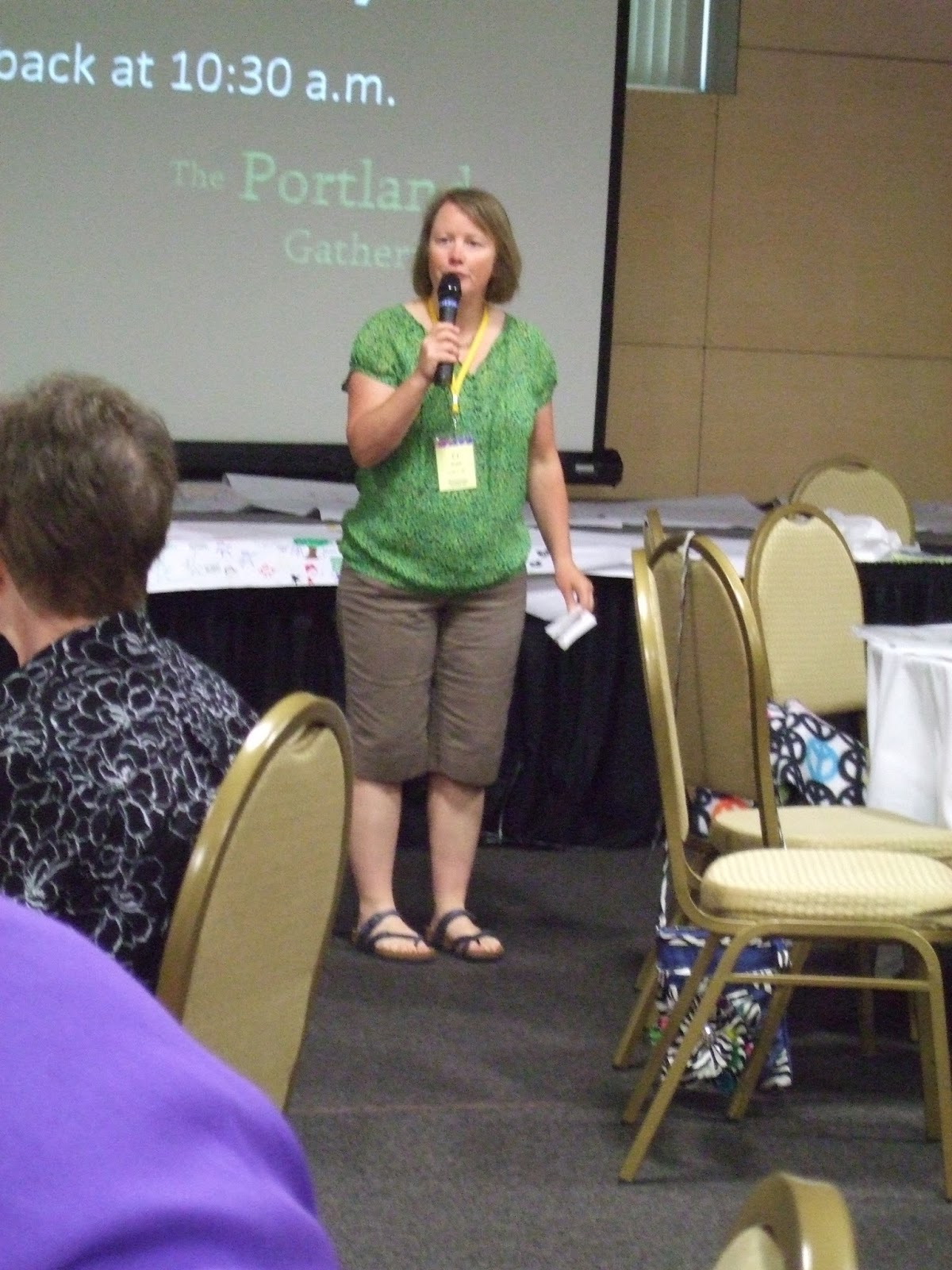 |
Michael Smull talking on the history of
Person Centred Thinking and Practices
|
The theme of Wednesday's session of the Portland Gathering was to discuss how to keep true to the core values of person centred practices.
Shae Dotson and Sherry Anderson began the day, exploring the role of planning in enabling people to live better lives. Shae quoted Antoine de St Exupery: "A goal without a plan is just a wish"
Michael Smull gave a comprehensive account of the history of the Learning Community for Person Centred Practices.
 |
| 5 common dreams: all from us! |
He explored the problem of trying to discover what a person's dreams might be when that person had spent an institutionalised life with no opportunity to develop dreams beyond "to get the hell out of here". Back in the 1980s Michael and his colleagues had been talking to people who had remained 'stuck' in institutions because the information that accompanied them focussed on the most negative and embarrassing aspects of their history, often going back 20 or 30 years.
"These were people who if you read what the assessments said about them you would not want anywhere near you, but if you met them and spent time with them, you knew they were cool"
"The people we talked to came up with 5 common dreams, and we realised that these dreams didn't belong to these people, they were really our dreams for them. They were watching our faces very closely, and trying to help us by telling us what they thought we wanted to hear. We realised that dreams come from experience - from opportunities to get a little taste of something and say "I'd like more of that", so we started to realise that before you get a dream, you need to get a life, so we were grappling with the question "How are we going to figure out how people want to live if they don't have dreams?"
The questions and approaches they developed to answer this question began to form the basis of Essential Lifestyle Planning around 88-89. Michael shared that one parent had told him "PATH got my daughter her apartment. ELP got my daughter her life in that apartment", showing how the two approaches complemented each other.

Michael recounted how implementing ELP however was not plain sailing, and had several 'false starts', including many states trying to implement ELP without any training for those who would put plans into practice, imagining that plans could be 'self-implementing'.
He also discussed the difficulty of finding ways to teach ELP beyond simply demonstrating it and expecting people to copy. Here the work of Bill Allen, who introduced a whole range of teaching exercises and new tools that we now refer to as the 'discovery tools' was crucial.
By 2001 however they began to realise that there was still a major problem with implementation: In reality only a pretty small percentage of people needed to know how to write an ELP, but 100% of people needed to know how to implement a plan - how to make sure that what we learn is important to a person is present in their lives.
This led to the development of what we now call 'Person Centred Thinking', ELP was 'deconstructed', being broken into smaller and simpler skills that people could build into their everyday work, and processes like
Person Centred Reviews.
 |
| Shea Dotson scribing |
Alongside this it became obvious that it was absolutely necessary to involve families in planning, Mary Lou Bourne holding the first families planning together sessions with Shelley Dumas, and Sue Cullen developing approaches to enable people that use services to write their own plans.
The practices have spread out to other areas, including schools, older people, mental health services, and many other groups of people and internationally to the UK with Helen Sanderson, Canada, Australia, Europe and now India.
 |
| World Café Question |
As these processes, tools, skills and learning have been developed, all intellectual property rights have been given to the Learning Community for Person Centred Practices, a not for profit organisation, and lots of people are generously feeding their learning and resources into this pool of practice knowledge, such as Helen Sanderson who is collecting examples of great one page profiles and Nancy Mills who has built a website. "Our vision for the TLCPCP is to build a worldwide hub to share learning" said Michael "This would be easier if we had staff, but we don't".
Michael said that we need to be clear that Person Centred Thinking is "Not THE answer, but part of the answer". "We're still wrestling with how to move from "Power over" to "Power with" and how we form the partnerships necessary to achieve this".
The day went on to use World Café to think about the role of planning in enabling choice and control in people's lives, in the knowledge that the future is likely to be as challenging and full of change and new learning as the past.
We moved from table to table discussing these questions with new sets of people. There was a lot of discussion around the tendency for organisations and states to find ways to dilute or pervert the essence of planning. In the feedback the loudest round of applause went to the delegate who said "The role of planning is whatever it needs to be as defined by the person receiving supports"
The next section of the day was spent in a variety of breakout sessions. I went to the 'People Planning Together' session and was blown away by the quality of a curriculum that is enabling learning disabled people and other self advocates to become trainers in person centred thinking in their own right. Some of the discussion here was around what was required of a trainer, and ways of overcoming issues of communication, such as people who don't use words to speak.
One new thing I learned was the signs for 'important to' (hands clasped close to the heart) and 'important for' ( a wagging finger). Eddie asked us to make collages representing what was important to us, leading to a rich discussion over what worked and doesn't work in training from the experience of trainers, and the experience of learners.
From my point of view, the importance of the day's theme was given acute counterpoint when I read about the treatment of the son of
this BBC blogger who was unlawfully detained in a care unit:
"One of the unit's ideas was that he should have a
person-centred plan. He had to create a wish list, and came up with six things:
- Live at home with Dad
- Go on holiday to Somerset
- Have Christmas presents at home
- See Toy Story 3 at the cinema
- Have breakfast in the bacon shop
- Go swimming at Hampton open-air pool
All six wishes were refused because they were not considered to be in his best interests. To me, that's not a person-centred plan, that's a system-centred plan."
Every example of this kind of perversion of person centred practice generates cynicism and pessimism. One key role of the Learning Community for Person Centred Practices is to ensure that a community of practice exists that is strong enough to ensure that this kind of lip-service to PCP is never considered to be a true representation of the practice, and that the trainers and mentors accredited by the TLCPCP never allow their work to be perverted in this way.















